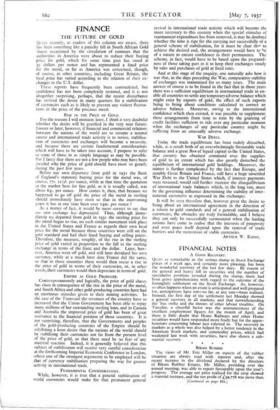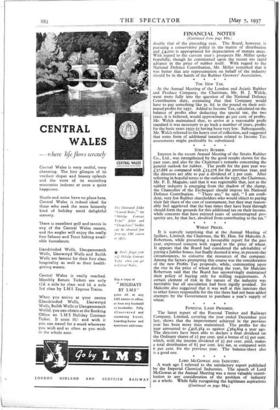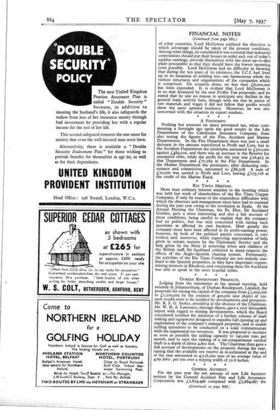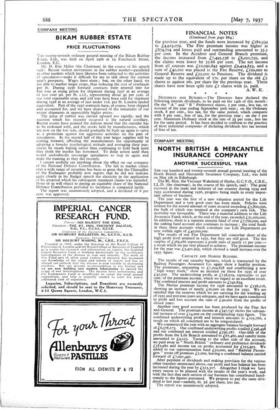FINANCIAL NOTES
A GOOD RECOVERY.
QUITE as remarkable as the serious slump in Stock Exrhange prices of a week ago, and certainly more pleasing, has been the wonderful recovery of the last few days. By reason of the general and heavy fall in securities and the number of speculative positions revealed during the slump, there had been grave apprehensions with regard to the outcome of the fortnightly settlement on the Stock Exchange. As, however, so often happens when an event is anticipated and well prepared for, anticipations have not—so far, at any rate—been realised. Instead, the first day of the settlement last Monday showed a general recovery in all markets, and that notwithstanding the 'bus strike and the threats of other labour troubles. Oil Tuesday, a cheerful factor was the announcement of the excellent employment figures for the month of April, and there is little doubt that Home Railways and other Home securities would have responded more freely but for the appre- hensions concerning labour just referred to. The recovery in markets as a whole was also helped by a better tendency in the American Stock markets, and commodity prices, which had weakened last week with securities, have also shown a sub- stantial recovery.
* * * *
Bnum RUBBER.
The views of Mr. Eric Miller on aspects of the rubber situation are always read with interest and, after the recent increase in the dividend declared by the directors of Bikam Rubber Estates, Mr.Miller, presiding over the annual meeting, Was able to report favourably. upon .the year's progress. The average net price realised for the crop showed a material increase, and the net profit of £39,778 was more than (Continued on page 882.)
FINANCIAL NOTES
. (Continued front page 880.) - double that of the preceding year. The Board, however, is pursuing a conservative -policy in the /natter of distribution and £4,000 is appropriated for depreciation of mature areas. With regard to the current year's _prospects Mr. Miller spoke hopefully, though he commented upon the recent too rapid advance in the price of rubber itself. With regard to the National Defence Contribution, Mr. Miller remarked that it was better that any representation on behalf of the industry should be in the hands of the Rubber Growers' Association.
* * * *
THE NEW TAX.
At the Annual Meeting of the London and Asiatic Rubber and Produce Company, the Chairman Mr. H. J. Welch, went more fully into the question of the National Defence Contribution duty, estimating that that Company would have to pay something like 3s. 8d. in the pound on their esti- mated profits for 1937. Added to Income Tax, calculated on the balance of profits after deducting the special tax, the two taxes, it is believed, would approximate 40 per cent. of profits. Mr. Welch maintained that, to arrive at a reasonable profit standard it was necessary to go back a number of years, profits for the basic years 1933-35 having been very low. Subsequently, Mr. Welch referred to the heavy cost of collection, and suggested that some form of additional taxation related to Income Tax assessments might preferably be substituted.
* * * * STRAITS RUBBER.
Interest in the recent Annual Meeting of the Straits Rubber Co., Ltd., was strengthened by the good results shown for the past year, and also by the Chairman's remarks concerning the general outlook for rubber. The profit for the past year was £37,888 as compared with £23,576 for the previous year, and the directors are able to pay a dividend of 5 per cent. After referring in hopeful terms to the outlook for 1937, the Chairman, Mr. F. E. Maguire, said that it was regrettable that, just as the rubber industry is emerging from the shadow of the slump, the Chancellor of the Exchequer should impose his National Defence Contribution. "There are," he said, "I am confi- dent, very few Rubber shareholders who would object to paying their fair share of the cost of rearmament, but they may reason- ably feel aggrieved that the lean times they have been through should form the grounds for this additional tax on their income, while concerns that have enjoyed years of uninterrupted. pro- sperity are, by that fact, absolved from contributing to the tax."
* * * * WHEAT PRICES.
It is scarcely surprising that at the Annual Meeting of Spillers, Limited, the Chairman, the Rt. Hon. Sir Malcolm A. Robertson, while presenting a favourable report for the past year, expressed concern with regard to the price of wheat. It appears that the Board had considered the advisability of paying a Jubilee bonus, but finally deemed it wise, in present-day circumstances, to conserve the resources of the company. Among the factors prompting this course was the consideration of the new Profits Tax proposals, while, commenting upon the rise in the price of wheat during the year, Sir Malcolm Robertson said that the Board has unswervingly maintained their policy of buying only for milling requirements. A certain element of risk in the nature of the industry was inevitable but all speculation had been rigidly avoided. Sir Malcolm also suggested that it was well at this juncture that to other forces responsible for the rise there had not been added attempts by the Government to purchase a year's supply of
wheat. * * * *
FORESTAL LAND PROGRESS.
The latest report of the Forestal Timber and Railways Company, Limited, covering the year ended December 31st last, shows that the improvement achieved in the previous year has been more than maintained. The profits for the year amounted to £458,384 as against £364,804 a year ago. The directors have been able to declare a final dividend on the Ordinary shares of 21 per cent. and a bonus of 24 per cent. which, with the interim dividend of 31 per cent. paid, makes a total distribution of 81 per cent. less tax, as compared with 6 per cent. for the previous year. The balance-sheet also
is a good one. * * * * Loan MCGOWAN AND INDUSTRY.
A week ago I referred to the satisfactory report published by the Imperial Chemical Industries. The speech of Lord McGowan at the Annual Meeting was a most valuable contri- bution to any consideration of the problem of industry as a whole. While fully recognising the legitimate aspirations
(Continued on page 8134.)
FINANCIAL NOTES
(Continued from page 882.) of other countries, Lord McGowan outlined the direction in which advantage should be taken of the present conditions. Among other things, he considered it was essential that industrial corporations should put their houses in order and, out of today's surplus earnings, provide themselves with the most up-to-date plant procurable so that they should have the lowest operating costs possible. Lord McGowan had no difficulty in showing that during the ten years of its existence, the I.C.I. had lived up to its intention of welding into one harmonious whole the various structures and organisations of the companies which it comprised. On research alone, no less than £6,000,000 has been expended. It is evident that Lord McGowan is in no way dismayed by the new Profits Tax proposals, and he stated that he saw no reason to anticipate any decline in the general trade activity here, though with the rise in prices of raw materials and wages it did not follow that profits would show the same upward tendency. Moreover, he was also concerned with the situation in export markets.
A POSTSCRIPT.
Nothing but pressure on space prevented me, when com- menting a fortnight ago upon the good results in the Life Department of the Caledonian Insurance Company, from also noting the figures of the Fire, Accident and Marine Departments. In the Fire Department there was just a small decrease in the amount transferred to Profit and Loss, but in the Accident Department the premiums amounted to £521,000 against £484,000, and there was an increase in the Reserve for unexpired risks, while the profit for the year was £16,415 in that Department and £70,289 in the Fire Department. In the Marine Department the premiums, after deducting rein- surance and commission, amounted to £86,208. A sum of £10,000 was carried to Profit and Loss, leaving £173,728 at the credit of the Marine Fund.
* * *
RIO TINTO MEETING.
More than ordinary interest attaches to the meeting which was held last week of shareholders of the Rio Tinto Copper Company, if only by reason of the stupendous difficulties with which the directors and management must have had to contend during the past year owing to the revolution in Spain. At the Annual Meeting the Chairman, the Rt. Hon. Sir Auckland Geddes, gave a most interesting and also a fair account of these conditions, being careful to explain that the company had no politics, but was only concerned with raising such questions as affected its own business. How greatly the company must have been affected in its profit-earning power., however, by both of the political parties concerned, is very evident and, moreover, while expressing appreciation of help given in certain matters by the Diplomatic Service and the help given by the Navy in removing wives and children of the British staff, Sir Auckland criticised in many respects the effects of the Anglo-Spanish clearing system. Fortunately, the activities of the Rio Tinto Company are not entirely con- fined to the Spanish properties, as they have important copper- mining interests in Rhodesia, and concerning these Sir Auckland was able to speak in the most hopeful terms.
DUFtBAN ROODEPOORT PROSPECTS.
Judging from the statements at the annual meeting, held recently in Johannesburg, of Durban Roodepoort, Limited, the proposals for raising the capital of the company from Li,000,000 to £1,200,000 by the creation of 400,000 new shares of los. each would seem to be justified by developments and prospects. Mr. R. S. G. Stokes, presidirg in the absence of the Chairman, Mr. W. H. A. Lawrence, through illness, gave a very favourable report with regard to mining developments, which the Board considered justified the initiation of a further scheme of shaft sinking and equipment designed to expedite full opening up and exploitation of the company's enlarged property, and to enable milling operations to be conducted on a scale commensurate with the augmented ore resources. It was proposed to increase as soon as possible the milling capacity to 140,000 tons per month, and to start the sinking of a six-compartment vertical shaft to a depth of about 4,800 feet. The Chairman then gave a full account of developments on the property during the year, stating that the available ore reserve as re-estimated at the end of the year amounted to 4,528,000 tons of an average value of 4.69 dwts. per ton over a stoping width of 52.6 inches.
GENERAL ACCIDENT.
For the past year the net amount of new Life business written by the General Accident Fire and Life Assurance Corporation was £2,854,496 compared with £2,884,687 for
(Continued on page 886.)
FINANCIAL NOTES
(Continued from page 884.) the previous year, and the funds were increased by £282,539 to £4,953,079. The Fire premium income was higher at £674,704 and losses paid and outstanding amounted to 35-5 per cent. In the Accident and General Branch premium, the income increased from £7,495,536 to £8,021,750, and the claims were lower by 55.66 per cent. The net income from all sources was £10,090,843 against £9,454,853, and a sum of L40,000 was placed to the Fire Reserve, Ltoo,000 to General Reserve and £25,00o to Pensions. The dividend is made up to the equivalent of 17s. per share on the old £5' shares as against i6s. per share for the previous year. These shares have now been split into Li shares with 55. paid.
A. W. K.
MITCHELLS AND BurLEas.—The Directors have declared the following interim dividends, to be paid on the tztth of this month : On the " A " and " B " Preference shares, 3 per cent., less tax, on account of the year ending September 30th next ; on the Ordinary stock, 8 per cent., less tax, for the same period, which compares with 6 per cent., free of tax, for the previous year ; on the 7 per cent. Maximum Ordinary stock at the rate of 3* per cent., less tax for the same period. It has been decided to conform to the practice of most industrial companies of declaring dividends less tax instead of free of tax.

















































 Previous page
Previous page